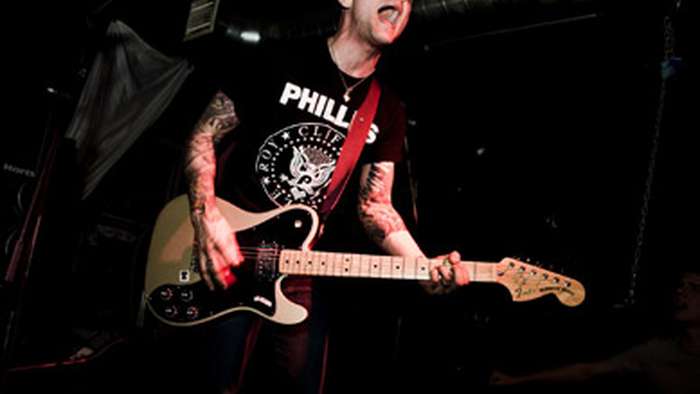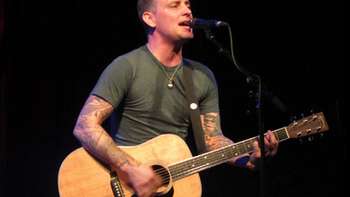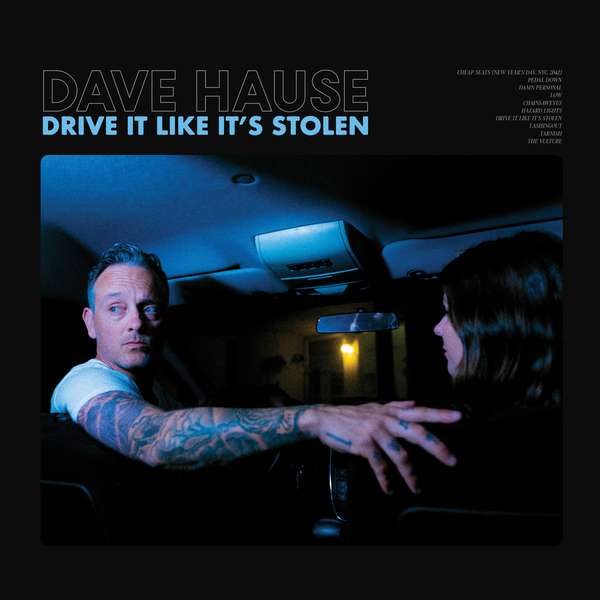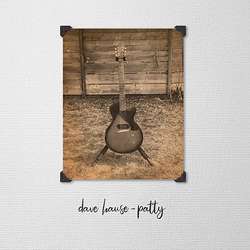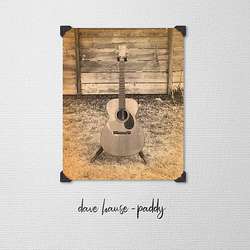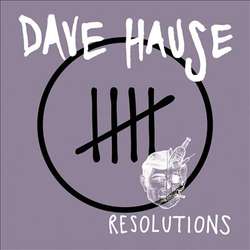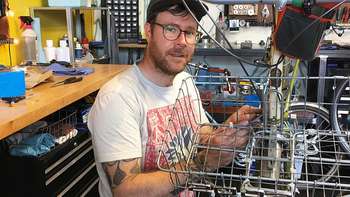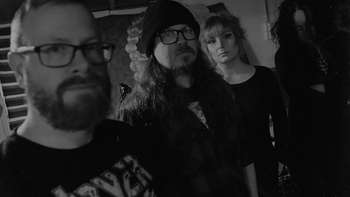Dave Hause seems tired but enthusiastic. He's just finished the first two weeks of shows on the Devour America tour. There will be another fifty-six days before he has some time off. The grueling schedule seems befitting of Hause, who's most recent album Devour deals with, among other things, the struggles of the American working class. It's a fitting metaphor. Later that evening, playing a sold out show at Toronto's Horseshoe Tavern, the former lead singer of The Loved Ones genuinely works to win over every member of the audience. He exudes an infectious energy, and while that energy is undeniably effective, it looks like it takes a lot of effort.
This effort is something that Hause seems proud of. As I'm setting up for the interview, Dave explains that the tour hasn't afforded him a lot of free time. I offer to postpone the conversation if he'd prefer, but he brushes off the idea. The interview, Hause explains, is a part of his job. And he feels extremely lucky to have the job that he does. It's this type of attitude, as present in his music as it is in our chat, that has been winning over fans and filling out venues during the singer’s frequent touring.
In our brief interview before his concert I had the chance to talk over Devour, songwriting, and the limiting factors of the singer/songwriter and punk rock labels.
Scene Point Blank: In a recent interview you said that the new album Devour was split into three parts. Where society is at, where you're at personally, and where you want to go. Was that split a conscious decision or was it a by-product of your writers block?
Dave Hause: There's a couple factors to that. The initial block of songs off the record were Loved Ones songs. When you're in a band setting, my thought was to make a more political statement. But on my own I didn't want to make an entire record about politics. Even if they were emotional responses to socio-economic issues. So there was that. Ultimately the thing that was holding me up was coming up with a silver lining, because it's a pretty dark record. Once it dawned on me that I had about four songs that were in one vein, and then four songs that lead out of that in another vein, it dawned on me that I wanted to make a finale, so to speak. The third act of the record.
Scene Point Blank: I have a theory about your bleak societal outlook on Devour. I think it's because Alex Levine of The Gaslight Anthem owns a Jimmy John's sandwich restaurant and you don't. Does that hold any weight?
Dave Hause: [Laughing.] No. In fact he's trying to get me in on some of his various investment schemes. I think with Jimmy John's I'll wait and see how it goes.
Scene Point Blank: So no jealousy?
Dave Hause: No, no. I wish nothing but happiness for him.
Scene Point Blank: You deal with a lot of personal subject matter in your writing. Do you ever get a reaction from the people those songs are about?
Dave Hause: Yep! [A pause.]
Scene Point Blank: Does that make you hesitant to write those kind of songs?
Dave Hause: No, but it's a hard thing to juggle because people that you love and care about, even if you're having a hard time with them or things don't necessarily work out, you are using them for your art or your job or whatever you want to call it. It's a tricky ground to step through. The way I'm navigating it is by just giving people a heads up: saying hey this could sound familiar. Some of what I write takes poetic license, it's not all true or totally autobiographical, but I think that music is weird that way. You don't go and see a Martin Scorsese movie and assume he's the Wolf of Wall Street. He's making a movie. I'm making a record…but there is a lot of shit in there that I've mined from my own personal life. I think you've just got to be careful.
Scene Point Blank: It's something I've struggled with in my writing. It's hard to balance being authentic and making people angry.
Dave Hause: Yeah. There's that “Father's Son” song. I called my Dad and talked to him. That term, you are your father's son, is just a poetic term meaning that you can't get out from under the person that you are. I'm the guy that's complicated. Dad isn't that guy who is womanizing, or drinking, or has an issue with devouring people. You know what I mean? None of that stuff in that song is actually about him. He's a sweetheart. He goes to work every day and provides for his family. I had to phone him and tell him what's coming. I told him that there's a song called “Father's Son” and I don't want him to trip out about it. But he's got to show that to his friends…so there is an element that's tricky.
Scene Point Blank: And the romantic realm?
Dave Hause: The romantic realm…well, that's something else entirely.
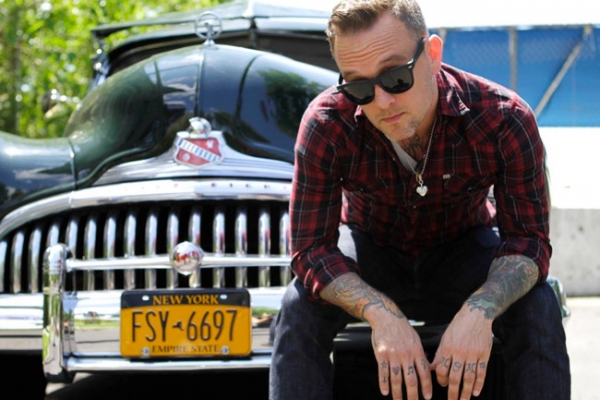
Scene Point Blank: Switching gears. The people who have played on the Revival Tour often get lumped together as singer-songwriters or folk rock. Does that get frustrating?
Dave Hause: I think the good thing about it is it gives people context. I've intentionally done as much as I can to get away from those labels. It's a great thing that Chuck [Ragan] does that Revival Tour. It's amazing and exciting, and I've been fortunate enough to do it many times. However, I'm in no way a folk musician. I'm in no way an acoustic musician. An acoustic guitar is a part of the tools for getting the songs across, but I would much prefer to play in a loud rock and roll band any day of the week. But I also like the freedom to be able to play a song on the acoustic or the piano, too. I think that you have to feel fortunate to be lumped in with a group of such amazing people and, at the same time, always be doing the thing that's truest to what you want to do. For me to drag a fiddle player, or an upright bass player, or a washboard player would be absurd…but to play in that context is cool. I don't know. It's important not to have your head up your ass about how you want to be considered. At the end of the day I'm just happy if anyone is paying attention. But I'm guy who played in punk bands. People will say all sorts of stuff about me.
"An acoustic guitar is a part of the tools for getting the songs across, but I would much prefer to play in a loud rock and roll band any day of the week."
Scene Point Blank: I wonder about that. I love both of your solo albums, but I think there are a lot of people who really wanted more Loved Ones-esque material.
Dave Hause: The Loved Ones don't even exist. Let's face it. We didn't break up, but we don't do anything. We don't play shows. We see each other and drink beer, and have fun, and crack jokes but everyone's gone on with their lives. They're doing what they're going to do. I'm not saying we'll never do anything together but for all intents and purposes that band is gone.
Scene Point Blank: What I meant by that is many people wanted another punk rock record from you and, as much as I love those ideas, that label can be limiting.
Dave Hause: I was frustrated with that in the band. Fat Wreck is an amazing label in terms of the way that they treat their artists. They pay on time and they're fair. But being lumped into that world is hard. It's hard for bands to work outside of the punk world, because it's such a defined thing. And that can get really frustrating if you want to do something different.
Scene Point Blank: The last third of Devour is talking about where you want to go. I understand the poetry of that idea, but do you have any specific goals in mind for your own future?
Dave Hause: I think the goal at my age is to achieve a level of balance. Balance between what you do for your job, while finding time for the people that you care about, eating properly, not partying too much. That's ultimately what I'm gunning for on a personal level. As far as the art? The end of the record is inviting you to come along. We're two records in. I've got more records up my sleeve; come along, and let's see what we can do. Without an audience you're just pissing in the wind.
